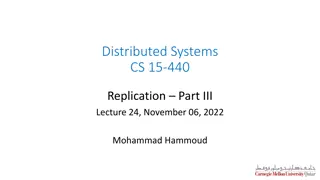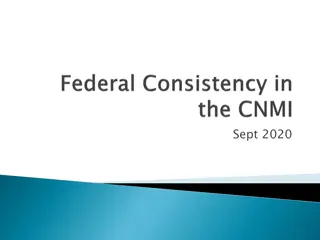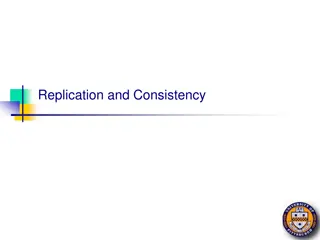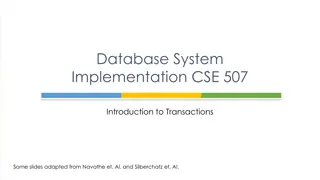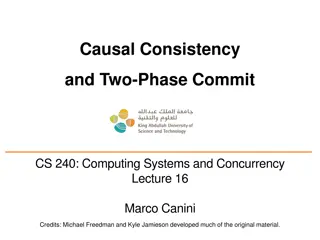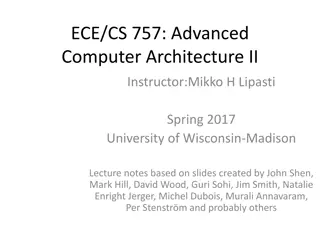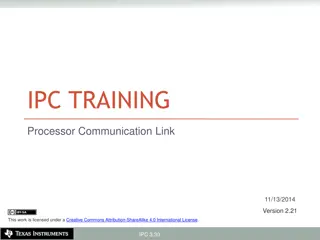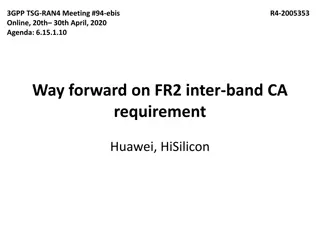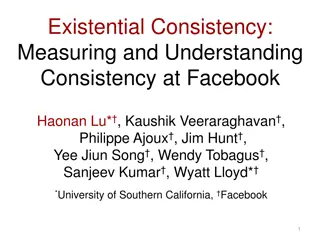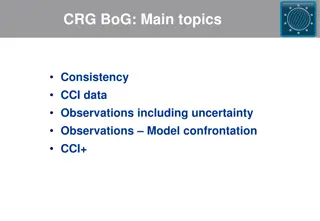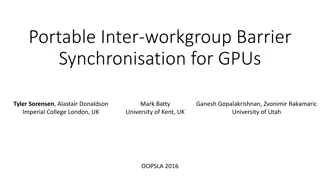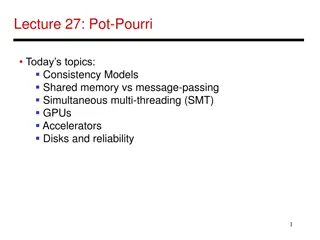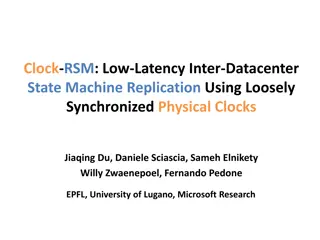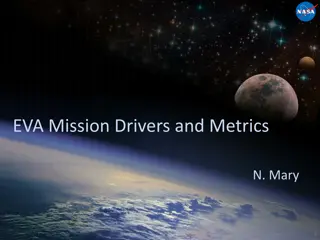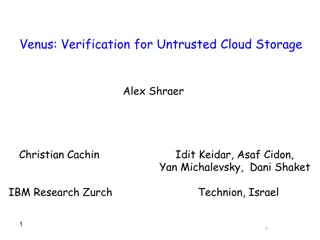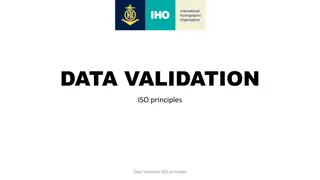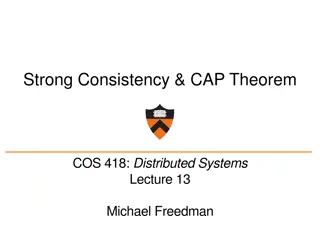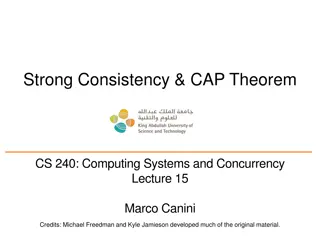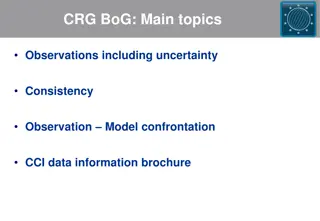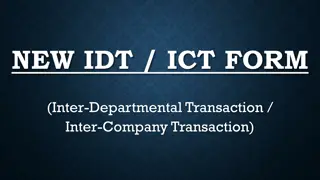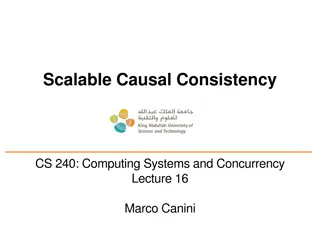Managing File System Consistency in Operating Systems
File systems in operating systems face challenges with crash consistency, especially during write operations. Issues arise when modified data in cache is lost due to system crashes or when data structure invariants are violated. Solutions like write-through and write-back caches help mitigate these
6 views • 14 slides
Guidelines for Upholding Rights of LGBTQ
In light of evolving societal norms and the imperative to safeguard the rights and dignity of LGBTQ individuals and inter-faith\/inter-caste couples, the Supreme Court has given guidelines for the handling of habeas corpus petitions and petitions for police protection.\nBackground:\nRecent instance
9 views • 4 slides
Understanding Consistency Protocols in Distributed Systems
Today's lecture covers consistency protocols in distributed systems, focusing on primary-based protocols and replicated-write protocols. These protocols play a crucial role in ensuring consistency across multiple replicas. One example discussed is the Remote-Write Protocol, which enforces strict con
0 views • 35 slides
Understanding Federal Consistency in Coastal Zone Management
This presentation serves as an introduction to Federal Consistency in the context of Coastal Zone Management, emphasizing the importance of compliance with enforceable policies outlined in the Coastal Zone Management Act. It highlights the role of the Division of Coastal Resources Management (DCRM)
1 views • 13 slides
Understanding Replication and Consistency in Computer Systems
Explore the concepts of replication and consistency in computer systems, discussing the benefits and challenges of using replicas for reliability, performance, and scalability. Learn about object replication problems and solutions, and the importance of maintaining consistency in shared data access.
1 views • 26 slides
Inter-Cluster Coordination and Information Management in Humanitarian Emergencies
Inter-Cluster Coordination and Information Management play vital roles in humanitarian emergencies. The coordination mechanism involves regular meetings convened by the RC/HC and coordinated by OCHA, providing opportunities for clusters to collaborate on shared planning, needs assessments, and poole
3 views • 13 slides
Inter-Agency SEA Community Based Complaints Mechanism in Nigeria
The Inter-Agency SEA Community Based Complaints Mechanism in Nigeria facilitates safe and confidential reporting of complaints, particularly related to sexual exploitation and abuse (SEA), by beneficiaries. Through inter-agency coordination, this mechanism ensures effective collaboration, messaging,
1 views • 18 slides
Understanding Properties of Database Transactions
Database transactions play a crucial role in ensuring data integrity and consistency within a database system. This content explores the fundamental properties of transactions, such as atomicity, durability, consistency, and isolation. It delves into the requirements and implications of each propert
2 views • 44 slides
Managing Inter-Departmental Transfers in Financial Accounting
Inter-departmental transfers involve recording and charging costs from one department to another, with different pricing bases like cost-based and market-based transfers. Unrealized profits in transfers are adjusted using stock reserves. Entries are made at the selling price to include costs and pro
1 views • 7 slides
Understanding Causal Consistency in Distributed Systems
This content covers the concept of causal consistency in computing systems, exploring consistency models such as Causal Linearizability and Eventual Sequential. It explains the importance of logical clocks like Lamport and vector clocks, and how they ensure order in distributed systems. The concept
0 views • 35 slides
Scalable Causal Consistency for Wide-Area Storage with COPS
This paper delves into the importance of scalable causal consistency for wide-area storage with the COPS system. It explores desired properties such as availability, low latency, partition tolerance, and scalability within data centers. The document discusses the challenges of achieving consistency
0 views • 41 slides
Memory Consistency Models and Sequential Consistency in Computer Architecture
Memory consistency models play a crucial role in ensuring proper synchronization and ordering of memory references in computer systems. Sequential consistency, introduced by Lamport in 1979, treats processors as interleaved processes on a shared CPU and requires all references to fit into a global o
1 views • 64 slides
Discussions on Programmers' Needs, Memory Models, and Consistency in Software Development
Today's discussions covered various topics including what programmers require, the debate on defining memory models for achieving Sequential Consistency (SC), considerations for data-race-free programs, and the performance trade-offs of weaker memory architectures. Insights into partial and relaxed
2 views • 22 slides
Overview of Inter-Processor Communication (IPC) in Processor Communication Link
Overview of Inter-Processor Communication (IPC) entails communication between processors, synchronization methods, and supported device types. The IPC architecture supports diverse use cases with various thread combinations and messaging types, catering to multi- or uni-processor environments. The A
0 views • 110 slides
Agreements on FR2 Inter-Band Carrier Aggregation Requirements
Agreements have been reached on the RRM requirements and scaling factors for FR2 inter-band Carrier Aggregation, focusing on common beam and independent beam management. Discussions include alignment with Release 16 specifications, scenarios, and RF architectures. Interruption requirements for diffe
0 views • 8 slides
Understanding Consistency at Facebook: A Study on Existential Consistency
This study explores the measurement and comprehension of consistency at Facebook, focusing on existential consistency. Key topics covered include consistency performance, fundamental tension between consistency and performance, anomalies in Facebook systems, and strategies for quantifying and preven
0 views • 30 slides
Ensuring Consistency and Addressing Data Issues in Climate Change Observations
This content delves into the efforts to maintain consistency among different essential climate variables and related datasets. It discusses interactions with the CCI Data Portal and Toolbox projects, as well as challenges such as data gaps, uncertainty descriptions, and issues with data formats. Str
0 views • 9 slides
Portable Inter-workgroup Barrier Synchronisation for GPUs
This presentation discusses the implementation of portable inter-workgroup barrier synchronisation for GPUs, focusing on barriers provided as primitives, GPU programming threads and memory management, and challenges such as scheduling and memory consistency. Experimental results and occupancy-bound
0 views • 61 slides
CITEL Working Instruments and Strategic Initiatives for Radiocommunications
Inter-American Telecommunication Commission (CITEL) plays a crucial role in coordinating strategic initiatives related to radiocommunications within the OAS. The Permanent Consultative Committee II (PCC.II) focuses on radiocommunications and works towards preparing for World Radiocommunication Confe
1 views • 10 slides
Understanding Memory Consistency Models and Communication Paradigms in Computer Systems
Memory consistency models define the ordering of writes and reads in computer systems. Coherence ensures write propagation and serialization, while consistency models guide programmers in writing correct programs. Shared-memory and message-passing are two communication paradigms with different appro
0 views • 31 slides
Low-Latency Inter-Datacenter State Machine Replication Using Clock-RSM
Clock-RSM introduces a low-latency approach to inter-datacenter state machine replication by utilizing loosely synchronized physical clocks. This method ensures strong consistency, fault tolerance, and fast failover in a geo-replication environment. By overlapping ordering and replication using phys
0 views • 29 slides
Understanding EVA Mission Drivers and Metrics
Decomposing Design Reference Mission operational concepts helps identify EVA mission drivers, necessary system capabilities, and gaps. Factors like mission purpose, duration, suit maintenance, environment, and communication delays heavily influence mission success. Purpose, types of EVAs (contingenc
0 views • 12 slides
Ensuring Integrity and Consistency in Remote Storage Systems
Venus project aims to address trust issues in cloud storage by guaranteeing integrity and consistency to users even in the presence of faults. It explores strong consistency requirements, challenges in achieving it, and proposes solutions like fork linearizability to handle faulty servers effectivel
0 views • 18 slides
Challenges in Establishing a Secure Inter-Domain Routing System
The daunting task of creating a secure and trusted inter-domain routing system poses significant challenges due to the decentralized nature of the internet. Addressing issues such as propagation of false routing information, ensuring correct reachability, and dealing with the lack of a clear truth m
0 views • 15 slides
Understanding the CAP Theorem and Database Consistency
Exploring the CAP Theorem introduced by Eric Brewer, the concept of Basic ACID semantics in databases, the importance of consistency, and examples elucidating atomic writes and sequential consistency in multi-process execution.
0 views • 22 slides
Principles of Data Validation and Quality Evaluation According to ISO Standards
Explore the key principles of data validation and quality evaluation as outlined by ISO standards. The content covers the importance of logical consistency, format consistency, and the ordering of data quality evaluation process. It delves into the assessment of data completeness, accuracy, and suit
0 views • 26 slides
Understanding the Contact Hypothesis in Inter-group Relations
The contact hypothesis explores inter-group relations from a cognitive perspective, highlighting how initial stereotypes and prejudices can be challenged and changed through positive interactions. It emphasizes the importance of contact in altering perceptions and reducing prejudice, as demonstrated
0 views • 42 slides
Understanding Strong Consistency and CAP Theorem in Distributed Systems
Strong consistency and the CAP theorem play a crucial role in the design and implementation of distributed systems. This content explores different consistency models such as 2PC, consensus, eventual consistency, Paxos, and Raft, highlighting the importance of maintaining ordering and fault-toleranc
0 views • 29 slides
Understanding Strong Consistency and CAP Theorem
Explore the concepts of strong consistency, CAP theorem, and various consistency models such as 2PC, consensus, eventual consistency, Paxos, Raft, and Dynamo. Learn about fault-tolerance, durability, and the importance of correct consistency models in distributed systems. Understand how Paxos and Ra
0 views • 29 slides
CRG.BoG Main Topics: Observations & Consistency in Climate Studies
This document discusses observations, data continuity, validation methods, and consistency in climate studies. It touches on using available instruments, addressing data gap issues, lack of ground-based observations, and ensuring consistency between different Essential Climate Variables (ECVs). Vari
0 views • 8 slides
Geo-AQ Validation Needs Whitepaper: Enhancing Space-based Observation Capabilities for Earth's Atmosphere
Elaborating on the validation needs of the Geo-AQ Constellation, this whitepaper focuses on new challenges in geostationary atmospheric composition missions. It aims to enhance mission success by establishing inter-mission consistency targets and monitoring product accuracy. The document identifies
0 views • 11 slides
New IDT/ICT Form: Streamlining Inter-Departmental and Inter-Company Transactions
Streamline inter-departmental and inter-company transactions with the new IDT/ICT form. Easily transfer funds between different departments within the same company and across different companies. Two identical forms cater to Foundation and Philanthropic accounts, enhancing efficiency in financial pr
0 views • 13 slides
Understanding Shared Memory Coherence, Synchronization, and Consistency in Embedded Computer Architecture
This content delves into the complexities of shared memory architecture in embedded computer systems, addressing key issues such as coherence, synchronization, and memory consistency. It explains how cache coherence ensures the most recent data is accessed by all processors, and discusses methods li
0 views • 47 slides
Developing Dependability and Consistency in Personal Skills: A Comprehensive Guide
Understanding dependability and consistency as essential traits in personal skills is crucial for success in the workplace. This guide explores the meanings of dependability and consistency, their relationship, why they are important, and how to demonstrate them effectively. Students will discover s
0 views • 10 slides
Understanding Causal Consistency in Computing Systems
Explore the concept of Causal Consistency in Computing Systems, covering topics such as consistency hierarchy, Causal+ Consistency, relationships in causal consistency, practical examples, and its implementation within replication systems. Learn how it ensures partial ordering of operations and conv
0 views • 31 slides
Scalable Causal Consistency for Wide-Area Storage with COPS
This paper discusses the implementation of scalable causal consistency in wide-area storage systems using COPS. It delves into the key-value abstraction, wide-area storage capabilities, desired properties such as ALPS, scalability improvements, and the importance of consistency in operations. Variou
0 views • 42 slides
Efficient Inter-Company Netting Solutions for Multinational Corporations
Gain insights into the need for multi-currency inter-company netting systems, their benefits, limitations, and tips for successful implementation. Address global challenges in netting to streamline processes, reduce costs, enhance visibility, and improve efficiency in managing inter-company transact
0 views • 14 slides
Enhancing Data Movement Efficiency in DRAM with Low-Cost Inter-Linked Subarrays (LISA)
This research focuses on improving bulk data movement efficiency within DRAM by introducing Low-Cost Inter-Linked Subarrays (LISA). By providing wide connectivity between subarrays, LISA enables fast inter-subarray data transfers, reducing latency and energy consumption. Key applications include fas
0 views • 49 slides
Spanner Database Overview
Spanner is a globally distributed database system that offers configurable control, consistent commit timestamps, external consistency, and TrueTime API for handling distributed data. It uses a transaction model with two-phase locking and lock-free reads, providing globally sortable timestamps. The
0 views • 19 slides
Understanding Reliability Measures in Research Supervised by Dr. Mohammed Mahdi Sharifi
Reliability is crucial for assessing the consistency of metrics in research. Various methods such as inter-rater reliability, test-retest reliability, parallel forms reliability, and internal consistency reliability help ensure the dependability of research findings. By examining factors like judgme
0 views • 9 slides


